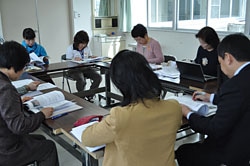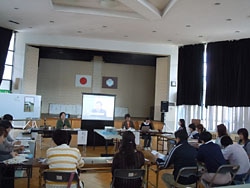



 |
The Japan Committee for UNICEF (JCU) provides assistance for fathers and single-father households in affected areas suffering from stress during this period of reconstruction. Support is aimed at ensuring that the stress and fatigue borne by fathers do not negatively impact families and child-rearing.
In December 2011, JCU entrusted NPO Niiza Childcare Support Network with the launch of the Single-Father Household and Fathering Assistance Project, under which training is conducted for individuals engaged in assistance efforts for disaster victims, such as experts, local government staff and social workers who deal with children and families in the affected areas. The training aims to teach technical skills, knowledge, information and conceptual skills related to single-father households and father parenting. In 2011, trainings were held in Sendai City and Ishinomaki City, Miyagi Prefecture. This year, efforts have also started in Iwate Prefecture with the help of the Iwate Prefecture Health and Welfare Division's Children and Families Section.
Between May and August 2012, a total of 10 fathering assistance training sessions were held in Rikuzentakata City, Ofunato City, Kamaishi City, Otsuchi Town, Yamada Town, Miyako City and Morioka City. A total of 208 individuals participated in the training, ranging from staff involved with child-rearing at nursery centres, kindergartens and child-rearing assistance centres, to social workers and child welfare workers, local government staff and consultants. As a result of the training, 33 "Papa Stations"* were established within the prefecture.
(*Papa Stations: See the Niiza Childcare Support Network website for more information (Japanese).)
 |
Today, support staff who participated in the training utilize their new tools acquired through the training to plan gatherings that serve as an opportunity to provide information to fathers and allow them to network with one another.
For two days between 7-8 November, JCU child protection advisors and Niiza Childcare Support Network staff held reporting sessions alongside their monitoring activities for relevant local government staff in the six coastal townships where the project is being implemented. Reporting sessions were held with the attendance of the Iwate Prefecture Health and Welfare Division's Children and Families Section, which co-leads the project and supervises the development of support tools. The sessions were also attended by the head of the Regional Coastline Development Bureau Welfare Section and staff working with families who host orphaned children. The Bureau is the prefectural government's office charged with responding to single-parent households. At the reporting session held at the Kamaishi City Children's Section (Health and Welfare Division), various challenges were addressed, including the difficulty of pulling together parents of single-father households who work, how to deliver the necessary information amidst an overflowing amount of flyers and event announcements, and the importance of civil-government cooperation on areas where the government's efforts alone are not enough. People also expressed their views about expanding fathering assistance in the long-term using a diversity of approaches.
The Japan Committee for UNICEF will continue to assist single-parent households affected by the disaster, focusing on single-father households and fathering assistance.
For more information about the Single-Father Household and Fathering Assistance Project, please see the Niiza Childcare Support Network website (Japanese).
All photo credits: © Japan Committee for UNICEF